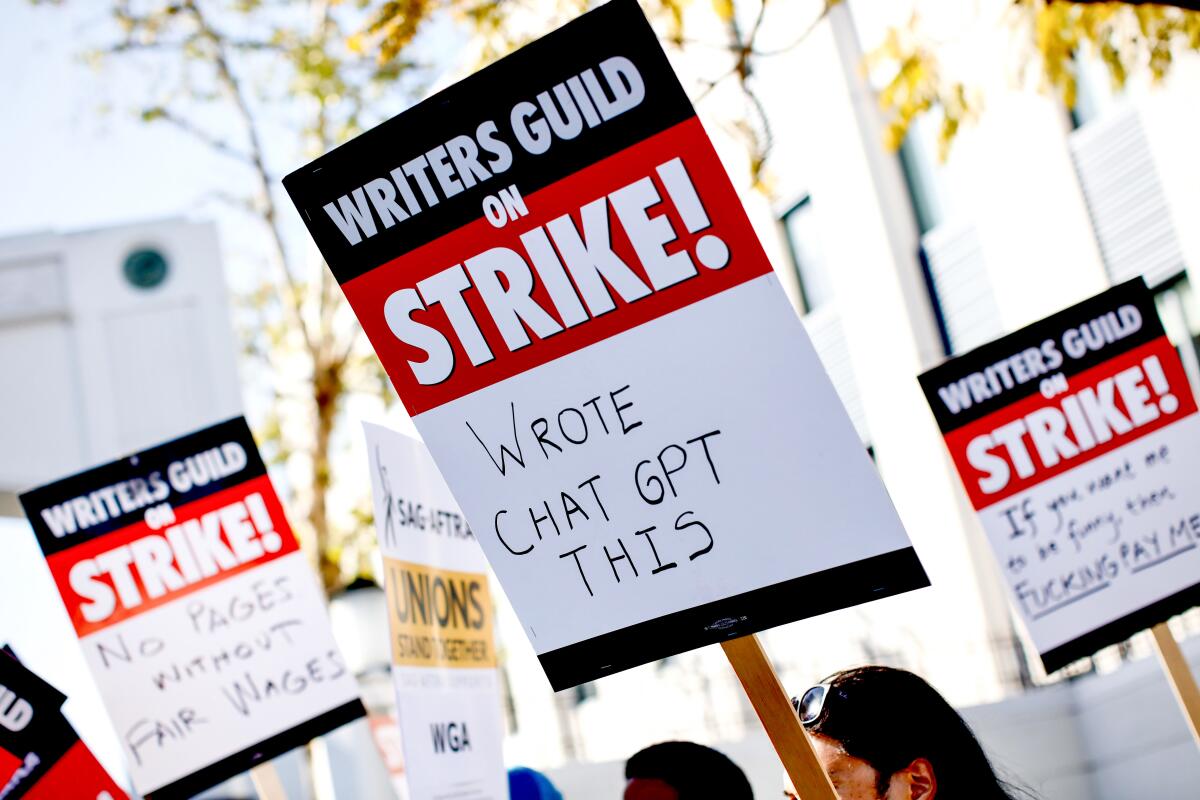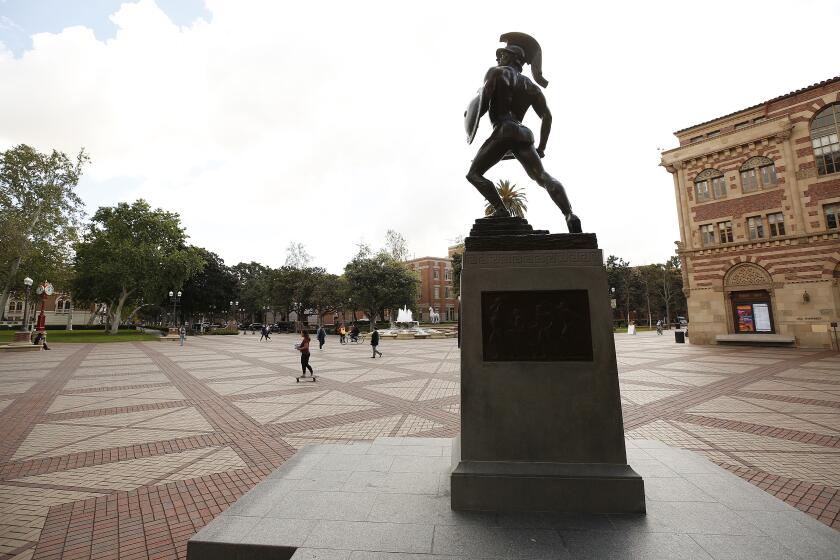Newsletter: Do we want a future where humans are truly entertained by AI?

Good morning. I’m Paul Thornton, and it is Saturday, July 15, 2023. Let’s look back at the week in Opinion.
Members of SAG-AFTRA, Hollywood’s largest actors union, joined their counterparts in the Writers Guild of America on the picket lines Friday morning, bringing nearly all film and TV production to a halt. This dual strike — the first in more than six decades that both writers and actors walked off the job — could be economically devastating to Los Angeles, and The Times’ editorial board encourages the unions and the studios to come to a quick and fair resolution.
Disruptive as these strikes may be, it’s heartening to see labor flex its muscle — as a union member myself, I care deeply about the success of organized labor — especially in an industry known for poor working conditions for everyone but its biggest celebrities. Writing on The Times’ op-ed page, UC Santa Barbara historian Nelson Lichtenstein casts the SAG-AFTRA and WGA strikes as part of a much broader, growing labor struggle that has Los Angeles as its epicenter. “Los Angeles today is a cockpit of labor militancy,” he writes, which is remarkable given the area’s historic reputation as the “open shop capital of America.”
Those issues aside I find myself preoccupied by more fundamental questions: Is this the future we want? Will people actually be entertained by an actor’s machine-generated likeness uttering machine-generated lines?
If you think these concerns are overblown, read this piece in Slate about what’s already being done with AI-created likenesses overlaid onto body doubles (at least human stand-ins aren’t obsolete). Some of the developments seem harmless — I doubt anyone will long for the era of awkwardly dubbed foreign-language films. But what they project is a near-future where we will no longer be able to tell whether what we see on the screen is an actual human or just its likeness, which has ramifications far, far beyond entertainment.
But entertainment is tremendously important. The kinds of stories and performances that draw our attention and amuse us provide a window into our soul, as the pleasure we derive from it comes from deep within our brain. In other words, people cannot suddenly and consciously change what causes us to be entertained. We know it when we feel it. And if we actually get to the point where we’re gut-level entertained by AI likenesses uttering chatbot dialog — a dystopia where we’re all fooled, and we know it — what will that say about humans?
This future, we’re told, is inevitable. The strikers don’t seek to thwart it as much as they seek fair compensation when it arrives. And when it does, maybe there will be a backlash. Maybe it will spark a renewed interest in theater and museums and nature and other real-life entertainment. Maybe there will be a market for “premium” films and TV programs shot with human actors reading human lines. Maybe they’ll hire editors and writers to insert errors into scripts to make them sound authentically human. But that will be a high price to pay for so profoundly altering our collective consciousness.
She worked as a teacher with Leslie Van Houten in prison and is glad the Manson “family” member was released. Van Houten’s parole sparked outcry from those who recall the horror of the Tate-LaBianca murders of 1969 (including among our letter writers). Angela Cardinale says she experienced an older, wiser, much more selfless version of Van Houten behind bars.: “Leslie is kind, thoughtful and compassionate. Not only is she not a threat to anyone, she can still do much good in the world. Leslie committed a horrific crime that I don’t excuse. But I also believe we are all capable of more than most of us are willing to admit, even to ourselves. Leslie is a good person who did a bad thing.”
The lasting threat is not the “next Trump,” but the MAGA base. Miles Taylor, the former Trump administration official of “Anonymous” fame (or notoriety), warns that the Republican base’s cult-like connection to the former president has inspired tens of millions of Americans to believe conspiracy theories that shake the foundation of American democracy. This isn’t something that just goes away with Trump — and when the “next Trump” does arrive, the institutions and norms that withstood the 45th president will be much weaker.
Disasters like the Rolling Hills landslide are foreseeable. The warnings are all around us. The benchmarks we’ve used to guide important decisions in the past — such as whether to build houses near a canyon in an area where landslides are not uncommon — won’t serve us in the future. Scientific models and forecasts have limitations, writes UC Irvine engineering professor Brett Sanders, but they should guide us in this era of rapid climate change.
Enjoying this newsletter? Consider subscribing to the Los Angeles Times
Your support helps us deliver the news that matters most. Become a subscriber.
It’s not the right time to admit Ukraine to NATO. The editorial board agrees with President Biden’s reasons for keeping Ukraine outside the military alliance and suggests the U.S. can still provide robust security absent membership.
Kids with summer birthdays face surprising health risks. Anupam B. Jena and Christopher M. Worsham, from Harvard Medical School, cite flu vaccine availability as one example.
More from this week in opinion
From our columnists
- LZ Granderson: Jailing unhoused people for sleeping in public is no solution to homelessness
- Jonah Goldberg: Yes, cluster munitions are awful. No, that doesn’t mean we shouldn’t give them to Ukraine
- Robin Abcarian: How the ripple effect of the Supreme Court’s 303 Creative decision could swamp civil rights
From the Op-Ed desk
- Why my pyromaniac neighbor lives outside the law
- The NATO summit must focus not just on winning the Ukraine war, but what happens after the fighting stops
- Op-Comic: What if abortion were self-defense?
From the Editorial Board
- It’s time for California’s public officials to return to work. In person
- Climate change is roasting L.A. The city can save lives by requiring A/C in rentals
- Goodbye gas. New all-electric homes show how to live without fossil fuels
Letters to the Editor
- Readers still aren’t buying Jon & Vinny’s “service fee” explanation
- These L.A. Democrats are blocking new housing in California
- Can a fetus be an attacker? On abortion as self-defense
Stay in touch.
If you’ve made it this far, you’re the kind of reader who’d benefit from subscribing to our other newsletters and to The Times.
As always, you can share your feedback by emailing me at paul.thornton@latimes.com.
A cure for the common opinion
Get thought-provoking perspectives with our weekly newsletter.
You may occasionally receive promotional content from the Los Angeles Times.




